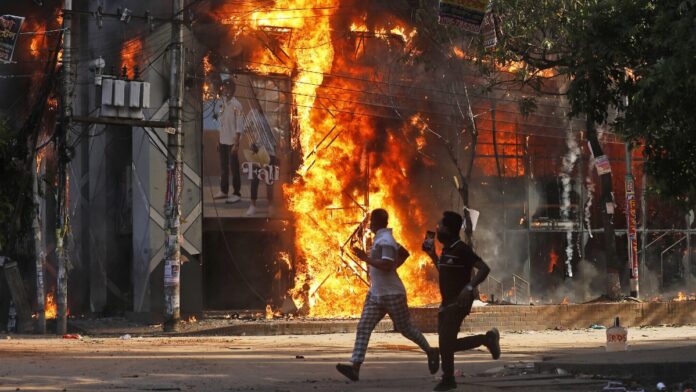Violent Unrest Erupts in Bangladesh
New Delhi: Bangladesh is facing a major crisis as protests demanding the resignation of Prime Minister Sheikh Hasina have escalated into violent confrontations. Over 300 people have been killed and hundreds injured, marking one of the deadliest periods of civil unrest in the nation’s recent history. The government has imposed an indefinite nationwide curfew and shut down internet services to curb the chaos.
The Spark Behind the Protests
The unrest began late last month, rooted in opposition to a controversial quota system that reserves up to 30% of government jobs for families of veterans from Bangladesh’s 1971 war of independence. Protesters argue that this system is discriminatory and favors supporters of Hasina’s Awami League party. They demand a merit-based system to replace the current quota, which has been a source of contention since its establishment in 1972.
Escalation and Government Response
The protests, initially concentrated among student activists at Dhaka University, quickly spread nationwide. The situation intensified when police and pro-government counter-protesters clashed violently with demonstrators. The government’s heavy-handed response included the use of tear gas and rubber bullets, leading to significant casualties.
On Sunday, at least 98 people were killed in a single day as police attempted to disperse tens of thousands of protesters. The violence surpassed the 67 deaths reported in July when students protested against the quota system.
Widespread Impact and Continued Unrest
The protests have evolved into a broader anti-government movement, drawing support from various sectors of society, including celebrities and garment manufacturers. The government’s decision to shut down high-speed internet services, including social media platforms, has added to the chaos.
Nationwide, protesters have attacked and vandalized public representatives’ homes, Awami League offices, police stations, and other government installations in 39 districts. In response, the government declared a three-day general holiday starting Monday.
Curfew and International Reactions
Despite the curfew and internet shutdown, the unrest continues to spread. Thirteen policemen were beaten to death in Sirajganj, and homes of two lawmakers were set on fire. The violence is not confined to Dhaka; it has reached districts such as Munsiganj, Pabna, Feni, and others.
The international community, including India, has advised nationals against traveling to Bangladesh amid the escalating violence. The Chief of Army Staff, General Waker-Uz-Zaman, has directed officers to ensure the security of lives, properties, and state installations.
Bangladesh is at a critical juncture as the demands for Prime Minister Hasina’s resignation grow louder. The deadly protests highlight the deep dissatisfaction and urgent calls for change among the Bangladeshi populace. The situation remains volatile, with the potential for further escalation in the coming days.
Also Read: Bangladesh Army Chief Announces Interim Government After PM Resigns Amid Protests









